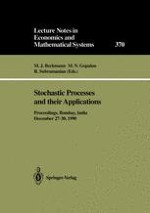1991 | OriginalPaper | Chapter
Queueing Models in Hierachical Planning Systems
Author : Klaus-Peter Kistner
Published in: Stochastic Processes and their Applications
Publisher: Springer Berlin Heidelberg
Included in: Professional Book Archive
Activate our intelligent search to find suitable subject content or patents.
Select sections of text to find matching patents with Artificial Intelligence. powered by
Select sections of text to find additional relevant content using AI-assisted search. powered by
Frequently, modern systems of production management are characterized by a hierarchical structure: Decisions on a higher level set targets to be considered by production planning and carried out by production control on subordinate levels. Setting targets on the superior level requires information about the performance, such as net capacities available on the subordinate level. As its performance depends on inventory planning and scheduling, decisions on the subordinate level which, in turn, depend on the targets to be fulfilled, this information is not available for planning on the superior level. Capacities available and other measures of performance may, however, be derived using appropriate mathematical models of the planning process.In this paper, several queueing theoretical approaches estimating the capacity and the throughput of subordinate manufacturing units in a hierarchical production planning surrounding are presented. Considering the assumptions necessary to find operable solutions, e.g. appropriate Markovian properties, it can be shown that models of open and closed queueing networks may be applied in the case of single item manufacturing and production of small batches. Whereas hybrid approach with a continuous flow of production and rates switching according to a semi-Markov process may be applied in the case of large batches.
